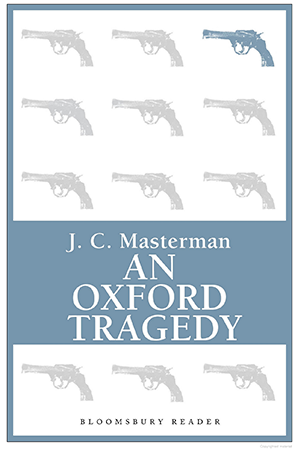A n Oxford Tragedy is a murder mystery in which not much at all happens. The story is set in St Thomas’s College, a fictional Oxford college, and is narrated by Francis Wheatley Winn, the Vice-President and Senior Tutor of the college.
The novel has a strong start. Winn introduces us to the Senior Common Room at St Thomas’s and to a visiting Viennese lawyer, Ernst Brendel. Existing tensions are established. Several of the Dons are shown to be in conflict with one or more of their colleagues, even some students. Brendel is an amateur criminologist and conversation at dinner turns to murder and cases Brendel has been involved with. Gradually, everyone leaves to follow their own pursuits and only Winn and Brendel remain, comfortably talking over drinks and smoking cigars. Their comfort is shattered, though, when one of the Dons bursts into the room to say that he has found the dead body of another Don in his rooms, shot in the head.
Obviously, this starts the murder investigation, with suspicion firmly focussed on the members of the Senior Common Room. Winn begs Brendel to help solve the mystery, and after that the story shifts between updates from Brendel as he reports his progress to Winn, and Winn’s observations of the aftermath of the murder.
The investigation is rather slow. It mainly consists of Brendel telling Winn who he has cleared of suspicion as alibis are established. As readers, we are not privy to this process. We only receive the narrative supplied to us by Winn based on what Brendel tells him. Eventually there are only two suspects left. And then the guilty person finally commits suicide, leaving an official suicide note for the police. In this note, he does not confess to the murder, but rather suggests that he has had a nervous breakdown due to the failure of some research followed by the shock of his friend’s death. There is also a more personal suicide note left for Winn in which the murderer explains everything. Brendel persuades Winn to keep the incriminating note to himself, and let the other note with the false explanation be the accepted version of events, for what seem to me to be very dubious grounds, that they should go along with the murderer’s wish that the reasons for the murder not be exposed . Of course, this means that the murder is never solved.
I did feel for the murderer based on his written confession and circumstances around the crime, but the suicide note was also a disappointing solution to a crime novel. In particular, the ending of the novel is a disappointment. We don’t really learn too much about anyone throughout the novel except Winn, and that’s where the story ends. We are meant to feel sorry for Winn, and I admit, I could empathise with his position. The college has been his entire life. His descriptions early in the book of the comfort and companionship he found during evenings spent in the Senior Common Room are evocative. It sounds idyllic, and I would like to relax in that atmosphere as well. So, the whole affair has consequences for Winn that have nothing to do with crime or the criminal system. By withholding the suicide note with the confession from the police, there are real consequences for the college. With the murder unsolved, the reader implicitly understands that almost anyone might face general suspicion. In the last chapter Winn sits in his rooms in the evening, rather than re-joining the social life of the College. The constant discussion of the murder adds to his feelings of not belonging anymore, driving a wedge between him and the younger Dons. He has lost his sanctuary and his tranquil, established life. So, I felt sorry for him. But this rather mournful ending did not change my overall feelings about the book. All this detail in the final chapters felt emotionally smothering.
But the real problem with An Oxford Tragedy is that it is a non-investigation. As crime stories go, this is disappointing. Crime stories are about the investigation and the logical reveal of the criminal. But the suicide note is tantamount to a confession which left little for a traditional crime novel to do.
This was an okay mystery but not a particularly interesting one to read. I’m glad to have read another new (to me) Golden Age writer. But I feel no interest in seeking out anymore of John Masterman’s works.
 RSS Feed
RSS Feed Facebook
Facebook Instagram
Instagram YouTube
YouTube Subscribe to our Newsletter
Subscribe to our Newsletter





No one has commented yet. Be the first!